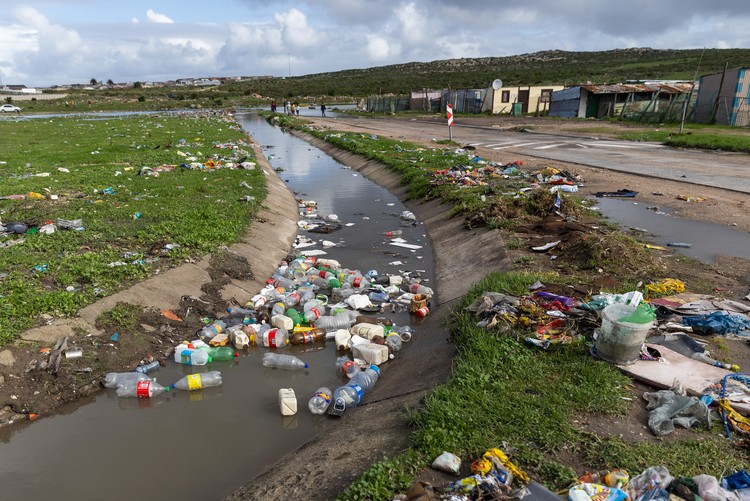
10 July 2025
Plastic litters a canal in Saldanha Bay after the winter rains. Environment Minister Dion George should join other African ministers in calling for a reduction in plastic production, says the author. Photo: Ashraf Hendricks
African environment ministers meet in Kenya next week for the 20th session of the African Ministerial Conference on the Environment. Our plea to Minister Dion George is to join other African nations who are calling for a reduction in plastic production.
In March 2022, a conference room in Nairobi erupted with a standing ovation, tears and embraces: the United Nations Environmental Assembly – 175 countries – had agreed on a resolution to “end plastic pollution”, forging a legally binding treaty addressing the full life cycle of plastic, reducing production, consumption and pollution.
There were two challenges: to “turn off the taps”, slowing the flow of plastic production; and to deal with the pollution choking our planet.
But agreeing on details has been laborious. It is clear that nations are divided mainly into two groups. Some, with “high ambition”, want to keep to the original spirit of the agreement, including a reduction in production. But others – South Africa among them – are pushing for the treaty to be watered down to a waste management treaty.
A legally binding agreement would help to strengthen existing South Africa legislation on plastic, but without a reduction in production it will not be enough to deal with the enormity of the plastic pollution crisis
In the words of the late Pope Francis, “The Earth, our home, is beginning to look more and more like an immense pile of filth.”
According to Tearfund, a Christian development organisation, globally we throw away about 300-million tonnes of plastic waste every year. That’s enough to cover almost 50,000 soccer pitches a day.
Waste management, of course, is extremely important but we must deal not only with the plastic pollution already in the system, but with the plastic coming down the line. Without reducing production, the piles of filth will continue to grow.
The new Climate Commission of the South African Council of Churches has declared 2025 the year to combat waste. The harmful impacts of all this plastic pollution are becoming more widespread and severe, making it impossible for faith leaders to look away.
Plastic pollution poses huge risks to people’s health at every stage of its life cycle. Our health is impacted during extraction of fossil fuels during the conversion of fuel into plastic, and finally during the disposal of plastic.
Thousands of hazardous chemicals have been found in plastics. Only a tiny portion of these are regulated under existing international agreements. These harmful chemicals can end up in our bodies and in the environment, leading to long-term consequences.
With poor service delivery in many communities, plastic is often burnt, releasing toxic fumes and chemicals that can lead to serious respiratory problems, with children and the elderly the most at risk.
Microplastics are in the air, in the food we eat and the water we drink. They can be found in our body, our brains, intestines and even placenta.
Plastic pollution clogs rivers and waterways, leading to flooding and increasing the risk of disease by creating breeding grounds for mosquitoes, flies and other vermin. The worst impacts of this are often felt in informal settlements.
Plastic pollution poses a significant hazard of choking and entanglement to farm animals. Studies have found that in some low- and middle-income countries, cattle consuming plastic, mistaking it for food, is a significant problem.
Fish, too, are affected: this is devastating for those who rely on fishing for their income. Plastic pollution also hampers crop growth by obstructing the flow of water and air in the soil. And in many places where the local economy relies on tourism, pollution is threatening businesses.
The oil used in plastic production releases carbon into the atmosphere, adding to the climate crisis. The plastic industry is the fastest-growing source of industrial greenhouse gas emissions in the world.
When plastic waste is burnt, it releases dangerous pollutants back into the atmosphere, which further contributes to the climate crisis.
But the solution is almost within our reach, if only the original vision of the plastic treaty can be fulfilled.
Our plea to our government and the South African negotiating team is to seize this once-in-a-lifetime moment and join other African nations who are calling for a reduction in plastic production.
In addition, we need to ensure that the plastic still being produced is made to be used for a long time and doesn’t contain harmful chemicals.
We must call for a strong treaty that stops the production of throwaway plastics and products containing harmful chemicals, a treaty which enables companies to design safer, reusable plastic products.
We must make sure every country has the money, technology and systems to implement the treaty rules - a treaty that can become stronger over time as we learn what works or what doesn’t.
We say to Minister Dion George and his negotiating team, let us not reduce the plastics treaty to a waste management agreement.